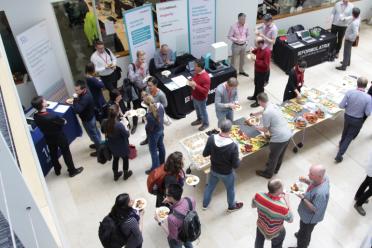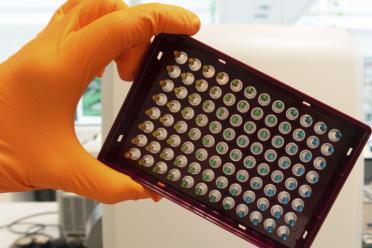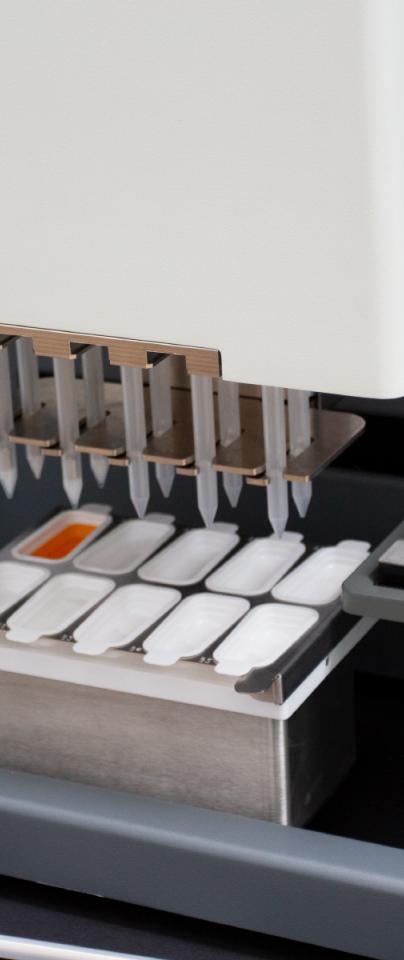Exciting developments in single cell genomics
Are you ready for Norwich’s third single cell symposium? Join us at EI - the heart of where single cell technologies and cutting edge genomics pipelines come together. It will be awesome.
Are you ready for Norwich’s third single cell symposium? Join us at EI - the heart of where single cell technologies and cutting edge genomics pipelines come together. It will be awesome.
Single cell genomics has really flourished over the last three years, with the uptake of technologies such as 10X Genomics enabling more and more studies at incredible scale. Three years ago, a study of a thousand single cells was considered big; this year there have been several publications with hundreds of thousands, or even millions of cells analysed.
The technology has been applied across the board in terms of biology too, with single-cell studies of plant and microbial cells starting to emerge, which is really exciting.
We asked Iain Macaulay, EI’s Technical Development Group leader, what excites him about the single cell community, and what lies in store for single cell genomics in the years to come, from our new RNA-seq pipeline through to vast projects such as the Darwin Tree of Life.
As he tells us in answer to our last question, “it will be awesome.”
The last two events have been a great chance to meet and chat with other people doing similar work, to share what we know and to learn from others, and we’ve seen a few really interesting collaborations start from the meeting, which has been great.
What’s really great is seeing researchers from completely different fields (e.g. plant and biomedical) sharing ideas on how to perform experiments or analyse data, because fundamentally, working with single cells, they are working with the same kind of biological unit.
Also the catering has been really good the last two years so I am hoping for more of the same!


What’s really great is seeing researchers from completely different fields (e.g. plant and biomedical) sharing ideas on how to perform experiments or analyse data.

Dr Iain Macaulay, Technical Development Group Leaader.
It’s a great opportunity to meet people working on similar problems in many different areas of biology. The presentations are from a diverse range of researchers, some early on in their single-cell work and others with a complete story to tell.
Lots of people are coming from outside Norwich but it’s great to see a cohort of single-cell researchers emerging at Norwich research park too.


It’s a great opportunity to meet people working on similar problems in many different areas of biology.

Yes, it’s really growing – there is an enormous appetite to apply genomics tools to questions in cell biology. Globally, the number of papers published using single-cell approaches is growing incredibly fast (with the number of cells being analysed growing exponentially) and the number of methods and tools for analysis is also increasing at a dizzying rate.
What’s great is that it’s starting to take hold in Norwich too, and we’ll see that from some of the presentations at the symposium.

Globally, the number of papers published using single-cell approaches is growing incredibly fast and the number of methods and tools for analysis is also increasing at a dizzying rate.

Dr Iain Macaulay, Technical Development Group Leaader.
It’s a really exciting time for us at EI – with our Genomics Pipelines team, we will soon be rolling out a single-cell RNAseq pipeline (using the Smart-seq2 protocol) to researchers through our National Capability in Genomics and Single Cell Analysis. We’re also looking to upgrade some of our single-cell isolation capabilities, and we’ll be saying more about this at the symposium.
We’re also going to be expanding some of our work to look at environmental single cell sequencing – taking single-cell organisms from the environment and trying to capture as much information about their individual genomes and transcriptomes as possible – as part of the Darwin Tree of Life project.


It’s a really exciting time for us at EI – with our Genomics Pipelines team, we will soon be rolling out a single-cell RNAseq pipeline

Dr Iain Macaulay, Technical Development Group Leaader.
I think it’s unique because we have an enormous amount of infrastructure and expertise under one roof coupled with a really strong problem solving ethos. We’re building a cell biology capability within a world-class genomics and bioinformatics pipeline, so it’s easy to go from cells to sequencing and analysis.
This really makes it a great place to both lead or collaborate on projects from a wide range of biological systems, developing new methods and tools where necessary. Our expertise in automation is a particular bonus, as this enables us to think about projects that require higher throughput than an ordinary lab might be able to support – but what’s great is that EI can support external researchers with these things, either through collaboration or our Genomics Pipelines team.

We’re building a cell biology capability within a world-class genomics and bioinformatics pipeline, so it’s easy to go from cells to sequencing and analysis.

Dr Iain Macaulay, Technical Development Group Leaader.


Our expertise in automation is a particular bonus, as this enables us to think about projects that require higher throughput than an ordinary lab might be able to support.

I think it will continue to grow and attract people working with more and more detailed biological questions.
We are seeing (and will continue to see) higher and higher resolution “atlases” of organism development, and these will reveal lots of things about how different cell types “use” their genomes and how gene regulatory networks work in normal or perturbed/diseased tissue.
There will also be an increase in the study of cell lineaging – which is kind of like studying the family tree of an individual cell. But probably the next big thing will be integrating spatial data into the mix, so we no longer just look at the expression of individual cells in suspension, but also see how they are positioned within complex, organised tissues. This is on the cusp of becoming mainstream, and once the technology is there, the biology will follow – it will be awesome.

But probably the next big thing will be integrating spatial data into the mix, so we no longer just look at the expression of individual cells in suspension, but also see how they are positioned within complex, organised tissues.

Dr Iain Macaulay, Technical Development Group Leaader.
I believe this symposium will be a great opportunity to learn about the progression in single-cell, to share our results and ideas and to visualise new opportunities for research in our field.
~ Johana Hernandez, Postdoctoral Scientist
I am looking forward to hearing about different project ideas, methods, and ways to interpret data.
~ Ashleigh Lister, Research Assistant
Having been part of the Macaulay group for a year now I have spent much of my time learning about single-cell technologies and various multi-omic protocols. Before starting here, I wasn’t familiar with the subject at all so one thing I’m looking forward to is being able to discuss the work I have done this year with other fellow single-cell biologists. Meeting other scientists implementing single-cell approaches is not only interesting of course, but it also helps me to understand my own project better and how it relates to and/ or differs from what others are doing. From a personal perspective, it will be a good opportunity to see how much I have learned this past year, and perhaps where I may be able to develop my knowledge further as a single-cell biologist.
~ Anita Scoones, PhD student
During the Single Cell Symposium I look forward to listening to inspirational lectures on the clonal dynamics of cancer stem cells and how methods for clonal studies evolved in the last 50 years allowing us currently to simultaneously perform single cell multi-omics studies.
~ Edyta Wojtowicz, Postdoctoral Scientist